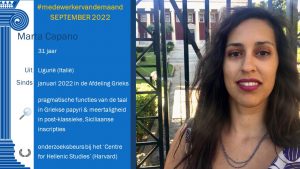We’re not only saying goodbye to summer this month, but also to our beloved colleague Marta Capano, who has been working on the ERC project “Everyday Writing in Graeco-Roman and Late Antique Egypt” since January. Anne-Sophie Rouckhout talked with Marta, to ask her about new adventures, fond memories and an exciting event that took place this month…

Hi Marta! You have been part of our section as a scientific collaborator for the EVWRIT project. Can you tell us a little bit about the work you have been doing?
Hello, and thanks for this opportunity! At Gent, I have been working with the EVWRIT research group, which investigates communication in documentary papyri. With Prof. Klaas Bentein, EVWRIT’s PI, I researched pragmatic functions in the language of Greek papyri, and especially on the link between textualization and speech acts, which means that we want to understand how the writer organized what they wished to express or achieve. For instance, it is very interesting seeing how politeness and making a request interact with each other! You can read very fun papyri from the 1st c. CE where subordinates carefully try to make their bosses do things without being disrespectful!
New adventures ahead, because you have been rewarded a fellowship at the Centre for Hellenic Studies of Harvard University. Congratulations! What research will you be working on there?
Thank you so much! It’s going to be a lot of fun! Here at the CHS I’m conducting my own research project on multilingualism in Sicily in the postclassical period. Basically, I study the choice of inscribing bilingual inscriptions (similar texts in different languages on a single stone) and the social implications of this choice. What does it mean if you have a private funerary stone that is bilingual? And what if there is a public monument with two languages? In addition, I investigate phenomena of language contact with Latin and Punic on seemingly monolingual Greek texts. It’s fun to see how sometimes you can have a monolingual Greek inscription with a lot of language contact, while a public bilingual inscription with two texts that are purposefully “pure”, without any form of contact. Also, the Center for Hellenic Studies has welcomed many Gentenaars over the years, and it is a spectacular place to do research. Check it out on the internet!
I study the choice of inscribing bilingual inscriptions and the social implications of this choice. What does it mean if you have a private funerary stone that is bilingual? And what if there is a public monument with two languages?
We also have another reason to congratulate you, because a little bird told us you got married a few weeks ago – at a medieval cloister, no less! What was that like?
Aw, thank you! It was a truly wonderful, sunny, and happy day! We got married in a former convent in Sestri Levante, Italy, with a lot of friends from many parts of the world. A friend of mine actually married us, and it was a fully bilingual wedding! My husband is an American academic, and just won a Fulbright scholarship to conduct his research in Greece, so we had to separate just a few days after the wedding – we’ll see each other again in two months. Our case is not unique in academia, but it still feels very wrong not to be together. Hopefully, our commitment to our careers will pay off.
Did you find some time for holidays this summer, to take a break from both work and the wedding preparations? Have you been able to plan a honeymoon?
Well, I had to spend some of my vacation dealing with the wedding organization, because marrying a foreigner requires extra bureaucracy, so alas I could not go anywhere else but to my hometown in Liguria. However – as my brand-new husband says – there are worse things in life than spending time in an Italian town on the sea. For the honeymoon, we are thinking of the Dutch Caribbean, possibly Bonaire. I suspect neither of us is yet tired of trying to speak Nederlands (quite poorly, by the way).
I love Belgian food (and drinking) culture, the beautiful Belgian architecture, and the very diverse language landscape.
I find it fascinating how dialects change across a very small geographic area.
Which fond memories will you take with you from Ghent? And what Belgian peculiarity/custom/habit will you miss most?
I am very fond of Ghent! I’d never been to Belgium before coming to UGent, and I immediately fell in love with the University and with Flanders. Ghent University is very open to foreigners, and everyone made me feel at home – I hope to return in the future, also because I miss so many friends already! Outside academia, I love Belgian food (and drinking) culture, the beautiful Belgian architecture, and the very diverse language landscape. I find it fascinating how dialects change across a very small geographic area. In Europe, this is something I’ve seen in only in Italy, and it’s a richness to be very proud of. On a personal level, I will always be fond of the lack of ostentation of the Flemish people, and their love for broodjes! I found myself preparing a broodje here in Washington DC. Let me tell you, it is not the same away from Ghent’s canals and summer light.
Thank you, Marta! Good luck with your research project and enjoy your stay at Harvard University! We hope to see you again soon to have a Gents broodje together!